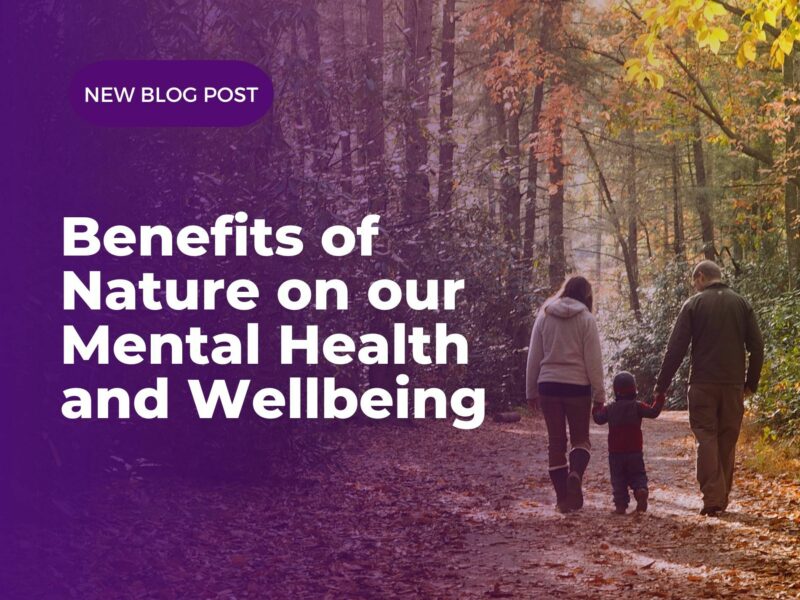Spending Time Outside: Benefits of Nature on our Mental Health and Wellbeing

During the fall, enjoying a pumpkin spice latte (or treat) is a popular self-care activity that often steals the spotlight on social media. However, with autumn’s beautiful display of red, yellow, and orange leaves, it’s my opinion that spending time in nature as a self-care practice does not get the attention it deserves! Self-care refers to activities and practices that reduce stress and restore energy to maintain and enhance our physical and mental wellbeing. While there are many ways to engage in self-care, here we’ll explore why adding NATURE into self-care can be beneficial for our mental health and wellbeing.
Why is self-care important?
Neglecting self-care can leave us feeling emotionally, physically, and mentally drained. When our energy is low and we are overly stressed, it can affect our ability to think, solve problems, and/or regulate our emotions. High levels of stress over a long period of time can lead to negative health issues and burnout. Self-care activities and practices help us take a break from stress, allowing the mind and body to relax and restore energy. Taking breaks can also boost creativity and productivity.
Self-care is important for both children and caregivers. It is easy for caregivers to forget about themselves when they are juggling many responsibilities. However, it is vital for caregivers to take care of their own health and wellbeing, as only when we first help ourselves can we effectively help others.
Why is spending time in nature beneficial for our health?
Research shows that spending time in nature has many benefits for physical and mental health. It can reduce stress, restore concentration and attention, enhance feelings of connectedness, and boost our mood and emotional wellbeing. Further, turning off technology to spend time in nature can have restorative effects on attention and enhance learning. So, the next time you take a break to venture out for that pumpkin spice treat, consider enjoying it in a park!
How much outdoor time is good enough?
With the weather getting colder, you might be wondering how much time I need to spend outdoors to get the benefits. While any time is better than none, a study by White et al., (2019) found that people reported better health and wellbeing after spending at least two hours a week in nature.
Some weeks our schedules are jam-packed and spending two hours outside is simply unrealistic. On these weeks, try taking advantage of the little moments you do get outside with a short mindfulness practice. For example, you and your child might practice mindfulness on your way to school by taking a quick moment to stop and notice the nature around you. You could ask your child to focus on what smells they notice as they breathe in the fresh air, what it feels like when the sun touches their face, and/or if they can hear any birds chirping nearby. Even a little self-care can go a long way!
Lutherwood’s Front Door Reminder
Spending time outside can be an accessible and affordable way to support our mental and emotional wellbeing. However, if you are a parent or caregiver supporting a child or youth who is struggling and needs additional help, Lutherwood’s Front Door is here for you.
References
Bratman, G. N., Anderson, C. B., Berman, M. G., Cochran, B., De Vries, S., Flanders, J., ... & Daily, G. C. (2019). Nature and mental health: An ecosystem service perspective. Science advances, 5(7), eaax0903.
Schertz, K. E., & Berman, M. G. (2019). Understanding nature and its cognitive benefits. Current Directions in Psychological Science, 28(5), 496-502.
Schilhab, T. S., Stevenson, M. P., & Bentsen, P. (2018). Contrasting screen-time and green-time: A case for using smart technology and nature to optimize learning processes. Frontiers in psychology, 9, 773.
White, M. P., Alcock, I., Grellier, J., Wheeler, B. W., Hartig, T., Warber, S. L., ... & Fleming, L. E. (2019). Spending at least 120 minutes a week in nature is associated with good health and wellbeing. Scientific reports, 9(1), 1-11.
Instagram Feed
“I am incredibly fortunate to have worked for Starling for 22 years. Our caring staff, their ability to adapt to changing client and community needs, and our strong value-based culture, give me immense pride to be a part of this wonderful organization.”












